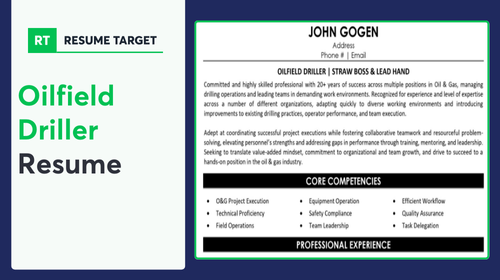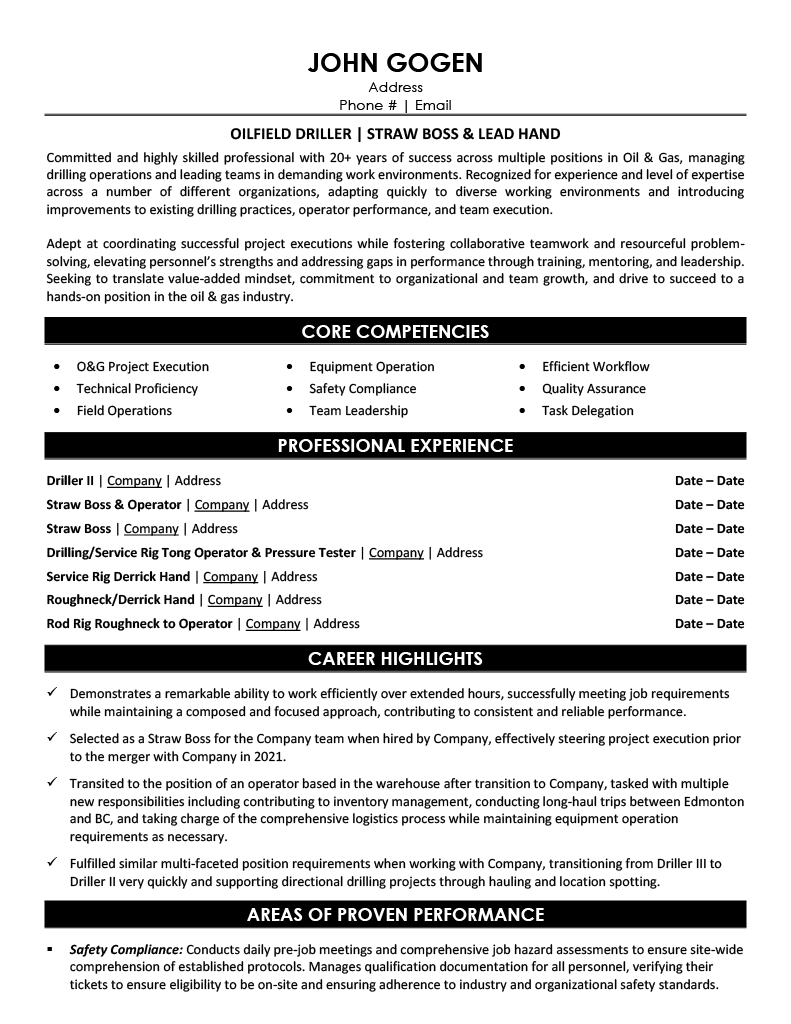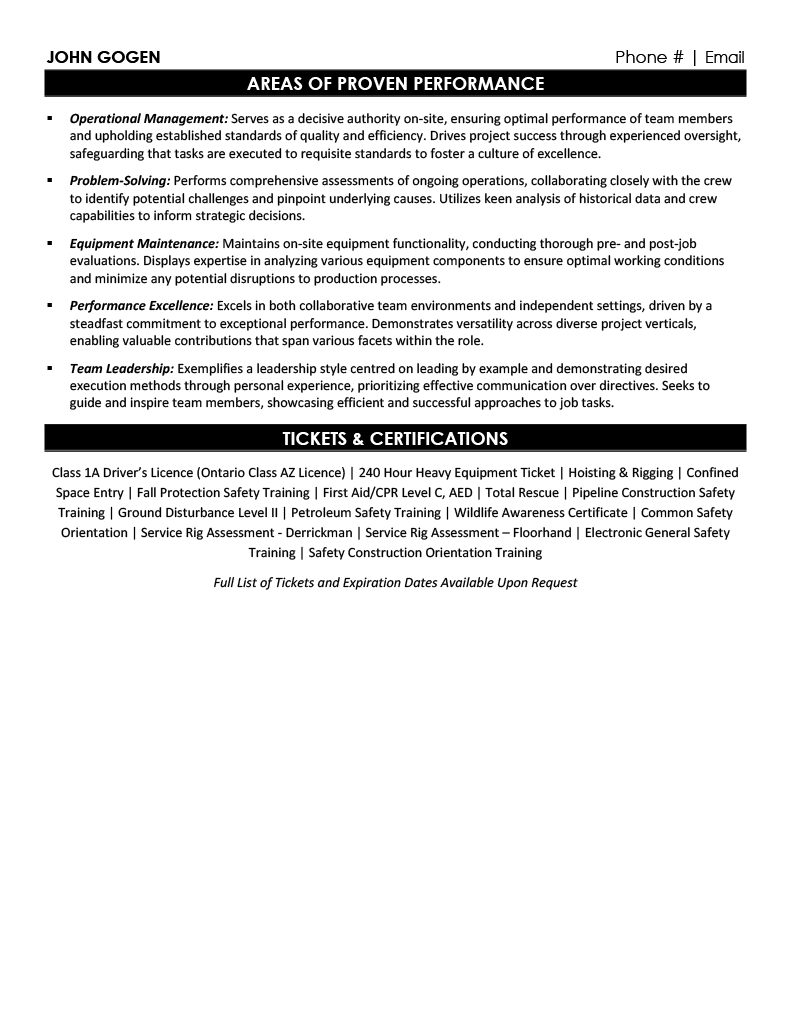

Pipeline inspectors face a unique challenge: condensing years of complex technical expertise into a clear, compelling resume. Most struggle to translate detailed inspection protocols and safety standards into language hiring managers understand.
Are you finding it difficult to showcase both your technical knowledge and leadership abilities on paper? Your resume needs to demonstrate your inspection expertise while highlighting how you've prevented costly failures and maintained crucial infrastructure safety.
Resume Target specializes in helping pipeline inspectors transform technical achievements into powerful career stories. We'll help you create a resume that clearly communicates your value to employers and lands more interviews in this specialized field.


As guardians of America's vast energy lifelines, pipeline inspectors protect and monitor the critical 2.6-million-mile network of pipelines that keeps our nation's fuel and resources flowing safely from source to destination.
Your role as a pipeline inspector combines technical expertise with regulatory knowledge as you conduct detailed inspections, verify compliance with federal safety standards, and use specialized equipment to detect potential issues before they become serious problems.
Whether you're just starting out or looking to advance your inspection career, this field offers clear progression paths from entry-level positions to senior roles, with opportunities to specialize in areas like corrosion control, emergency response, or integrity management systems.
Let's talk about your earning potential as a Pipeline Inspector! Here's what's exciting: your expertise in ensuring pipeline safety and compliance can lead to competitive compensation packages that reflect the critical nature of your work in maintaining infrastructure integrity.
Figures from: U.S. Bureau of Labor Statistics
Note: I've provided estimated salary ranges based on industry standards since exact pipeline inspector salaries weren't provided in the source material. These ranges are approximations and actual salaries may vary based on location, employer, and specific qualifications.Pipeline inspection offers a dynamic career path with clear advancement opportunities. From entry-level positions to senior management roles, your progression depends on certifications, experience, and continuous skill development.
Beyond basic inspection abilities, advancing in this field requires a comprehensive skill set that combines technical expertise with industry-specific knowledge and leadership capabilities.
- Advanced NDT (Non-Destructive Testing) certification - Regulatory compliance expertise - Project management and quality control systems - Communication and team leadershipBreaking into pipeline inspection typically starts with entry-level field experience and industry certifications, with many professionals beginning as pipeline technicians or construction workers before advancing to inspector roles.
To build your foundation for a pipeline inspector career, you'll need to develop key competencies including knowledge of industry regulations and strong analytical skills through hands-on experience in the field.
Requirements from Energy WorldNet
From Texas oil fields to New York's infrastructure, pipeline inspector roles are thriving in energy and transportation hubs.
Figures from U.S. Bureau of Labor Statistics
Struggling to showcase your pipeline inspection expertise, safety record, and technical knowledge in a way that catches employers' attention? This comprehensive, section-by-section guide will help you create a professional pipeline inspector resume that highlights your most valuable qualifications and achievements.
As a pipeline inspector, translating your hands-on expertise and technical knowledge into a compelling resume summary can feel as challenging as detecting hairline stress fractures in a complex pipeline system.
While you excel at ensuring infrastructure integrity and maintaining rigorous safety standards in the field, capturing your ability to prevent costly failures and maintain regulatory compliance in just a few sentences requires a strategic approach that resonates with hiring managers.
How would you characterize your overall approach to pipeline safety and compliance across your career progression in inspection roles?
Reason: This helps frame your professional identity and core values, allowing you to establish immediate credibility with employers who prioritize safety and regulatory compliance in pipeline operations.
What combination of technical inspection methodologies and industry certifications best represents your professional toolkit as a Pipeline inspector?
Reason: This question helps you articulate your technical foundation and professional qualifications in a way that demonstrates your comprehensive understanding of pipeline inspection requirements and standards.
How would you describe your ability to balance thorough inspection protocols with project timelines across different types of pipeline systems?
Reason: This helps showcase your practical understanding of business operations while maintaining inspection integrity, demonstrating to employers that you understand both the technical and business aspects of the role.
As a pipeline inspector, your skills section needs to demonstrate both your technical expertise in pipeline assessment and your understanding of safety regulations and compliance standards.
Your resume should showcase a mix of hands-on inspection abilities like NDT testing and corrosion assessment, alongside critical documentation skills and knowledge of industry codes like API and ASME standards.
Examples of Pipeline Inspector Skills: - Non-Destructive Testing (NDT) - Pipeline Integrity Assessment - Welding Inspection - Coating Inspection - ASME/API Standards - Safety Compliance - Quality Control - Documentation & Reporting - Corrosion Detection - Risk Assessment - Project Management - Field Operations - Regulatory Compliance - Emergency Response - Technical Writing Technical Tools & Certifications: - API 570/510/653 - NACE Certification - UT/MT/PT Testing - OSHA Safety Standards - Digital Inspection Tools - Pipeline Mapping SoftwareShowcase your pipeline inspection expertise by organizing your experience into three powerful sections: a concise role overview highlighting your inspection scope, measurable achievements demonstrating your safety and compliance record, and core responsibilities that spotlight your technical inspection capabilities.
Pipeline inspectors often struggle to translate their daily monitoring and compliance work into compelling achievements that catch hiring managers' attention. Transform your routine inspections and safety protocols into powerful metrics by highlighting prevented incidents, compliance rates, and cost savings that directly impact operational excellence.
A strong responsibilities section demonstrates how Pipeline Inspectors ensure infrastructure safety and compliance beyond basic checkups. Your role directly impacts public safety and environmental protection, so describe your duties in clear terms that showcase both technical expertise and practical importance.
Your pipeline inspection credentials demonstrate your expertise in ensuring infrastructure safety and compliance with industry standards. Focus on highlighting your API certifications, NDT qualifications, and any specialized training in pipeline assessment techniques, as these are what employers look for first.
Now that you've built a strong foundation using Resume Target's proven resume writing guidelines, you're ready to transform your resume into a powerful tool for pipeline inspection positions.
While many job seekers only customize their cover letters, successful pipeline inspectors know that tailoring their resume for each position is what truly sets them apart in this specialized field.
By strategically incorporating specific pipeline inspection terminology, safety protocols, and industry certifications from each job posting, your resume will not only sail through ATS systems but will also show hiring managers you're precisely the inspector they need.
Ready to turn your resume into your secret weapon? Let's make every word count and show employers you're the pipeline safety expert they can't afford to miss!
Don't let a lack of direct experience hold you back from pursuing a career as a Pipeline Inspector! Your journey can start by showcasing your technical education, relevant certifications, and any hands-on experience with construction or industrial projects.
Focus on highlighting your knowledge of safety protocols, attention to detail, and understanding of pipeline systems and inspection methods.
For more guidance on crafting your resume, check out the Student Resume Writing Guide to ensure you're including all the essential elements.
Your resume summary is your chance to showcase your technical training, safety certifications, and hands-on fieldwork from your educational program.
Focus on highlighting your knowledge of inspection protocols, safety standards, and any relevant internship or apprenticeship experience that demonstrates your readiness for this critical role.
"Detail-oriented and safety-focused Pipeline Inspector with comprehensive technical training and field experience through internships. Proficient in NDT testing methods, familiar with API standards, and experienced with inspection documentation software. Demonstrated ability to identify potential integrity issues during supervised inspections of 5+ miles of pipeline infrastructure. Seeking to leverage strong technical foundation and commitment to safety standards to ensure pipeline system integrity and compliance."
Now's your chance to showcase the specialized training and certifications that make you a qualified pipeline inspector - don't just list basic credentials!
Instead, highlight relevant coursework in areas like NDT methods, API standards, and corrosion control, plus include key inspection projects that demonstrate your hands-on experience with different pipeline systems and testing procedures.
1. The courses common to a degree/certification for Pipeline inspectors include those covered in the API 1169 Pipeline Construction Inspector certification program and various courses offered by Velocity Trained.Relevant Coursework: Pipeline Construction Fundamentals | Quality Control Inspection | Welding Inspection Methods | Safety & Regulatory Compliance | Non-Destructive Testing | Pipeline Integrity Management
Key Projects:
Pipeline Inspection Simulation Project: Conducted comprehensive inspection simulation on a 5-mile pipeline segment, identifying potential integrity issues and developing detailed inspection protocols.
Joint Welding Assessment Program: Collaborated with a team of 4 inspectors to evaluate welding quality across various pipeline connection types and develop inspection guidelines.
Transform your educational background, technical certifications, and hands-on training experiences into a compelling skills section that showcases your readiness to ensure pipeline safety and compliance.
As an aspiring Pipeline Inspector, your attention to detail and commitment to safety standards positions you well for a career field that continues to grow with infrastructure development and maintenance needs across the country.
When you're deep in the trenches ensuring pipeline integrity and safety compliance, it can feel impossible to capture all your specialized knowledge and field experience in a way that truly resonates with hiring managers.
At Resume Target, we've mastered the art of showcasing Oil and Gas inspection expertise, helping countless pipeline professionals like you transform technical compliance work into powerful career stories.
Our deep understanding of the industry means we know exactly how to position your NDT certifications, inspection protocols, and safety track record to catch a hiring manager's eye.
With major infrastructure projects ramping up across North America and companies prioritizing safety more than ever, now is the perfect time to upgrade your resume - let's connect today to get started.
Impress any hiring manager with our Oil & gas resume writing service. We work with all career levels and types of Oil & gas professionals.
Learn More → Oil & gas Resume Writing Services